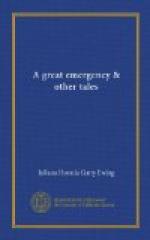At last this seemed to annoy him, so I went to contain myself by sitting on the potato-tub and watching the shore.
We got into the Thames earlier than usual, thanks to the fair wind.
The world is certainly a very beautiful place. I suppose when I get right out into it, and go to sea, and to other countries, I shall think nothing of England and the Thames, but it was all new and wonderful to Fred and me then. The green slopes and fine trees, and the houses with gardens down to the river, and boats rocking by the steps, the osier islands, which Mr. Rowe called “Aits,” and the bridges where the mast had to be lowered, all the craft on the water—the red-sailed barges with one man on board—the steamers with crowded decks and gay awnings—the schooners, yachts, and pleasure boats—and all the people on shore, the fishers, and the people with water-dogs and sticks, the ladies with fine dresses and parasols, and the ragged boys who cheered us as we went by—everything we saw and heard delighted us, and the only sore place in my heart was where I longed for Rupert and Henrietta to enjoy it too.
Later on we saw London. It was in the moonlight that we passed Chelsea. Mr. Rowe pointed out the Hospital, in which the pensioners must have been asleep, for not a wooden leg was stirring. In less than half-an-hour afterwards we were at the end of our voyage.
The first thing which struck me about Nine Elms was that they were not to be seen. I had thought of those elms more than once under the burning sun of the first day. I had imagined that we should land at last on some green bank, where the shelter of a majestic grove might tempt Mr. Rowe to sleep, while Fred and I should steal gently away to the neighbouring city, and begin a quite independent search for adventures. But I think I must have mixed up with my expectations a story of one of the captain’s escapes—from a savage chief in a mango-grove.
Our journey’s end was not quite what I had thought it would be, but it was novel and interesting enough. We seemed to have thoroughly got to the town. Very old houses with feeble lights in their paper-patched windows made strange reflections on the river. The pier looked dark and dirty even by moonlight, and threw blacker and stranger shadows still.
Mr. Rowe was busy and tired, and—we thought—a little inclined to be cross.
“I wonder where we shall sleep!” said Fred, looking timidly up at the dark old houses.
I have said before that I find it hard work to be very brave after dark, but I put a good face on the matter, and said I dared say old Rowe would find us a cheap bedroom.
“London’s an awful place for robbers and murders, you know,” said Fred.
I was hoping the cold shiver running down my back was due to what the barge-master called “the damps from the water”—when a wail like the cry of a hurt child made my skin stiffen into goose-prickles. A wilder moan succeeded, and then one of the windows of one of the dark houses was opened, and something thrown out which fell heavily down. Mr. Rowe was just coming on board again, and I found courage in the emergency to gasp out, “What was that?”




